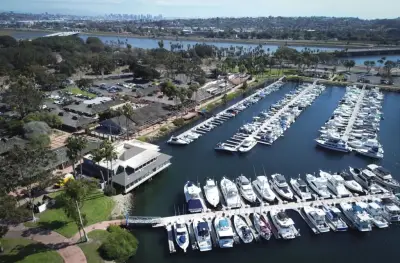Effort to declare Marina Village surplus land, opening it up to housing, implodes

This article first appeared in inewsource. Sign up for their newsletters here. Tucked in the far southwest corner of Mission Bay Park, the aging Marina Village conference center and boat docks seem an unlikely place for the latest controversy over housing in San Diego. But in July, the 28-acre site became the flashpoint over several related issues: a half-century old state law reconfigured to push local governments to build more affordable housing, skepticism over the city of San Diego’s real estate dealings and the future of Mission Bay parkland. While the move to designate the Marina Village parcels surplus land seemed to come out of nowhere and publicly surfaced in early July, a review of city and state records by inewsource shows that the property lease was being discussed inside City Hall starting in the first half of the year. In early spring, city staff began communicating with state officials on the state’s Surplus Land Act, which governs how public land has to be made available for affordable housing projects, and one potential developer had begun lobbying real estate staff. At the same time, a development group comprised of Suntex Marinas, one of the nation’s largest marina operators, and the Monarch Group — a small but extraordinarily well-connected La Jolla real estate firm — was working on a proposal that would bring a large hotel, revised marina and as many as 900 housing units to the Marina Village site. City officials have repeatedly said the proposal was “unsolicited.” The developers hired a trio of lobbyists who met with several city staff members in the Economic Development Department, as well as one senior staffer for Councilmember Jennifer Campbell, whose District 2 includes Mission Bay Park. Both efforts became public over two summer months, touching off a controversy that, for now, appears to be dormant. The city has backed away from its initial effort to designate the Marina Village parcels as surplus land — a move that under the law would trigger opening the land to the possibility of affordable housing. And most councilmembers have signaled they’re opposed to developing housing in the park. Yet the Marina Village skirmish became the latest example of San Diego residents suspicious of city hall motives — like the property owners in neighborhoods devastated by flooding in 2024, the controversies over the 101 Ash Street building and the Midway Rising redevelopment deal. And the issues that the battle raised are still not entirely resolved and could surface again. “This is not only a Mission Bay Park issue,” said former City Councilmember Donna Frye, who first sounded the alarm over the surplus land designation in an article for the publication OB Rag. “It’s an issue of citywide concern for any public park land.” The players While the city’s aborted efforts to designate the property surplus land is what initially spurred opposition and scrutiny, the development group behind the proposed remaking of the land received less notice. Suntex Marinas is a Dallas-based company that operates more than 90 marinas across the country, including several in California. In 2024, it formed a joint venture with private equity firm Centerbridge Partners. The firm provided $1.2 billion in funding for Suntex to acquire marinas and develop new ones. Its senior investment manager, Hampus Idsater, co-signed the July 21 unsolicited proposal to the city’s Economic Development Director, Christina Bibler. In April, Gov. Gavin Newsom appointed Idsater to a seat on the state Boating and Waterways Commission. The agency exercises some jurisdiction over marinas through the Division of Boating and Waterways. Commissioners serve four-year terms. Suntex joined forces with the Monarch Group. The private real estate firm has a wealth of connections in state and local politics and its partners have served on state boards and commissions after being appointed by governors and legislative leaders. Founding partner William “Pat” Kruer was a commissioner on the California Coastal Commission for more than a decade. He was first appointed in 1999 by then-Assembly Speaker Antonio Villaraigosa, now a candidate for the 2028 governor’s race, and served as chairman of the powerful body from 2006 to 2008. Kruer, who died last year, was active in state Democratic Party politics. His daughter Sarah Kruer Jager is also a partner at the firm. She served on the state Commission on Judicial Performance from 2016 through 2023. Then-Assembly Speaker Toni Atkins initially appointed her in the waning days of her speaker’s term, and then reappointed her three years later when Atkins headed the Senate Rules Committee. Jager is listed as the contributor of a $25,000 contribution in January 2024 from Monarch Housing Solutions LLC to an independent campaign committee supporting Mayor Todd Gloria’s reelection. It was the second largest contribution the committee received during the election cycle. The firm has another interest beyond real estate. Co-founders Rodney and Ryan Stone and partner Masis Kevorkian, are licensed owners of three cardrooms in the state, including Seven Mile in Chula Vista and two outside Sacramento. The Monarch Group’s website says it has developed, entitled or acquired more than 19,000 residential units since it was founded in 1997, about two-thirds of those in San Diego. “Monarch has a proven track record and long history of entitling and developing institutional residential and mixed-use projects that create innovative solutions to residential development challenges and entail extensive community engagement strategies,” it says. It’s unclear what prompted the developers to propose redeveloping Marina Village and include housing in the process. City records show that they retained the services of three lobbyists since the start of the year. Suntex hired Ledford Enterprises sometime in the first quarter of the year to lobby for a “lease assignment and lease extension” for Marina Village. Ledford reported lobbying Lucy Contreras, deputy director of the city’s real estate department, and Seamus Kennedy, the senior policy adviser to Councilmember Campbell. A spokesperson for Campbell said the meeting was held to outline plans for the parcel. Despite several inquiries, the offices did not say when the meeting was held, nor whether the housing component — which would become the most controversial — was discussed. Campbell was a supporter of the motion to scuttle the surplus land designation at a City Council meeting in July and made it clear she was opposed to housing in the park. City records also show that Stone Acquisition Group hired Southwest Strategies, a heavyweight firm that has been involved in some of the city’s biggest deals, sometime in the first half of the year. The firm lobbied Bibler and Contreras for “Marina Village lease extensions,” according to city lobbyist disclosures. Stone Acquisition is a limited liability company that state records show was registered with the Secretary of State on May 6. Stone, Kevorkian and Monarch Group co-founder Rodney Stone are listed as managers of the new entity, one of several LLCs under the Monarch Group name. And just last month, lawyer Ann Moore — who is also vice chair of the powerful San Diego Port Commission — filed paperwork with the city disclosing she too had been retained by Stone Acquisition for “redevelopment of Marina Village.” Suntex officials did not respond to a request for comment in the lease. Ryan Stone also did not respond to a message left at the firm. The proposal The plans for Marina Village were spelled out in an 11-page letter sent to Bibler on July 21, signed by Idsater and Ryan Stone. The lease is currently owned by the Southern California Pipe Trades Retirement fund, a union fund that has had it since 1977. The letter described a plan to build a resort-style 500 room hotel, with an event center and luxury spa and wellness center. The park master plan has long called for a hotel on that site. Added to that: up to 900 residential units, with 30% designated affordable housing “with a preference for hotel workers.” It noted that the developers were labor friendly and committed to Project Labor Agreements with the influential Building and Construction Trades union and UNITE HERE Local 30 hotel workers union. The developers said they would provide better public access than is available now, as well as shops, restaurants and other amenities. The proposal also contained an unusual sweetener. The developers said they wanted a short-term, three-year lease with the city — one year more than the current lease. In exchange, they promised to make not only all of the existing lease payments called for, but also pay the city $500,000 extra per year — a total of $1.5 million. That would give the city an extra year of revenue and allow for the master planning of the parcel. The letter also noted that the developers were aware the city was considering declaring the parcel surplus land under the state law — and asked officials to hold off and instead consider the short-term lease proposal. But by this time, the city had begun quietly moving down that track. Surplus land The Surplus Land Act dates from the late 1960s, and was changed in 2020 to prioritize building affordable housing. The changes require that before disposing of any land via sale or a lease longer than 15 years, a local government has to notify potential developers that the land is available for a 60-day period. If a proposal is received during that time, the government has to enter into “good faith” negotiations for 90 days. Proposals with affordable housing included get priority in negotiations. Nothing in the law obligates the local government to make a deal, and if none is made, the property can be marketed to the general public. At a low-key meeting on July 2, the City Council’s Land Use and Housing Committee approved designating the Marina Village parcel surplus land — the first step in the process. City officials have said their ultimate goal is to redevelop and generate more revenue out of the Marina Village leasehold. One little-noticed piece of the city’s proposed action would have waived a requirement that properties the city wants to declare surplus must first be circulated among departments, to determine whether there was potentially some other city use. That would mean the city could go directly to issuing the notice that the property was available to any potential outside developers. Councilmembers Sean Elo-Rivera and Kent Lee downplayed the possibility that any housing could be built in the park, given the restrictions from the Mission Bay Park Master Plan, the general plan and the daunting number of approvals needed. A section of the city charter also says any property dedicated for park use can be used for other purposes only if two-thirds of city voters approve the change. When Elo-Rivera asked whether there was any “outside interest” in developing the property, a city staff member responded that there was “nothing formal in place right now.” While there was no formal interest, lobbying records show that representatives for both Suntex and Stone Acquisitions Group had meetings with Bibler and Deputy Director Lucy Contreras some time in the first part of the year. The meetings Though the Marina Village lease went in front of a council committee, it did not go in front of the Mission Bay Park Committee, a group of residents and business representatives that advise the city on policy issues inside the park, before the July 29 council meeting. In addition, the move to declare the land surplus was heard at the final council meeting before the summer recess, and put on the consent portion of the agenda. That is where numerous items are passed in a single vote, without any individual discussion unless a councilmember asks for one. Marina Village in Mission Bay Park is seen on Oct. 9, 2025. (Photo by Sandy Huffaker/For inewsource) Councilmember Marni Von Wilpert removed the item from the consent calendar, touching off a discussion among the council. Councilmember Stephen Whitburn asked Bibler whether there was any urgent reason to declare the property surplus at that time. Bibler explained that the city had assembled a list of properties leased by the city that had expired leases, or would take a longer time to negotiate new deals. The Marina Village leases are on that list, she said, even though the leases will not expire until spring 2027. They were included “in order to prioritize negotiations sooner, rather than later, in the interests of gaining more revenue through our real estate opportunities.” She also said that while the proposal to declare the property surplus land had been brought before the land use committee just a few weeks earlier on July 2, “technically the department has been working on it since about December.” Ultimately the council voted 7-1 to continue the item until an unspecified meeting in September. All this fed the outrage that occurred when word of the planned designation came out. Frye’s articles in the OB Rag helped surface the issue. About a week later, city representatives appeared in front of the Mission Bay Park Committee to explain the surplus land process. At the meeting, residents assailed the move to declare the land surplus and thereby potentially opening it up to housing. The committee ultimately voted against it. In front of what was a controlled but hostile audience, Council President Joe LaCava made the case for the designation by echoing what fellow councilmembers had said in the two previous meetings on the issue — that it was highly unlikely that developers would make a bid to build housing there. He instead said that making the declaration would speed the process of redeveloping the property. And while he and other officials said the city was not interested in housing at Marina Village, no mention was made at the meeting of the proposal the city had received days earlier that included 900 residential units. When that did become public weeks later, it merely confirmed the suspicions of opponents like Bob Ottilie, a lawyer and former chairman of the Mission Bay Park Committee. “The appearance of how all this has been handled is frankly scandalous,” he said. “This is the most incredible proposal I’ve ever seen come to the council. You’re going to take one of our two most prized parks and turn it into a housing development.” Just days after the Suntex and Marina proposal became public, the city backed off entirely. On Sept. 3, Gloria wrote to the state asking it to exempt Marina Village from the Surplus Land Act. He argued that the land “is governed by charter, general plan, and master plan restrictions that exclude housing as a permissible use.” State officials have not yet responded. Gloria’s communications director, Rachel Laing, said in an email that if no exemption is granted, the city may try to pursue a legislative change that would exempt Mission Bay — and possibly other park land that would be subject to the act. She added that there are no plans to bring the issue of declaring Marina Village back to the City Council. Still, such assurances don’t convince Frye and others. “I think these people are very serious, because I don’t think they would’ve put together the proposal if they weren’t,” she said of the Suntex-Monarch proposal. “And I don’t think that they would be hiring lobbyists to go and meet with city staff. And if you look at the lobbying reports, what are you going to see? You are going to see the people that were lobbied. “And the people that were lobbied were the very people that are saying, ‘We can’t get an exemption. We have to comply with this Surplus Lands Act. There’s no way around it. It’s the only option we have. But not to worry, because nobody’s going to take it seriously. And we don’t think anyone’s gonna come up with a proposal.’ “But they already have. And they knew that.” The Marina Village controversy may have died down, but it could be a sign of things to come. At the July 2 land use committee meeting, Bibler told the committee that the city — cash-strapped and facing a massive structural budget deficit — was looking to pull the most revenue it can out of its numerous leases. She said the city was looking at all of its properties, not just those in the park, whose highest and best use would be longer-term investment. Marina Village happened to fit that bill. “This is an example of us prioritizing properties that may be toward the end of their lease life or have the potential to create additional partnerships in the future,” she said. “This is just the first of many you will see coming to this committee in the future.” inewsource is a community-focused nonprofit, nonpartisan newsroom dedicated to investigative and accountability journalism. The news outlet is a 2025 Pulitzer Prize finalist.


